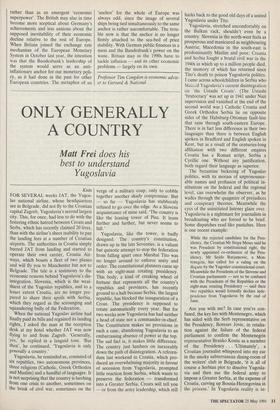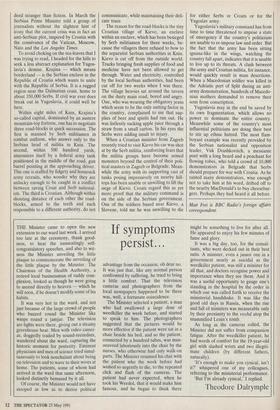ONLY GENERALLY A COUNTRY
Matt Frei does his
best to understand Yugoslavia
Knin FOR SEVERAL weeks JAT, the Yugos- lav national airline, whose headquarters are in Belgrade, did not fly to the Croatian capital Zagreb, Yugoslavia's second largest city. This, for once, had less to do with the festering ethnic hatred between Croats and Serbs, which has recently claimed 20 lives, than with the airline's sheer inability to pay the landing fees at a number of Croatian airports. The authorities in Croatia simply barred JAT from landing and started to operate their own carrier, Croatia Air- ways, which boasts a fleet of two planes and will fly you to Manchester but not to Belgrade. The tale is a testimony to the economic reasons behind Yugoslavia's dis- integration. Slovenia, which is the weal- thiest of the Yugoslav republics, and to a lesser extent Croatia, are no longer pre- pared to share their spoils with Serbia, which they regard as the scrounging and squandering bully of the Federation.
When the national Yugoslav airline had finally paid its bills and regained its landing rights, I asked the man at the reception desk at my hotel whether JAT was now flying to and from Zagreb. 'Generally, yes,' he replied in a languid tone. 'But then', he continued, 'Yugoslavia is only generally a country.'
Yugoslavia, he reminded us, consisted of six republics, two autonomous provinces, three religions (Catholic, Greek Orthodox and Muslim) and a handful of languages. It is not surprising that the country is lurching from one crisis to another, sometimes on the brink of civil war, sometimes on the verge of a military coup, only to cobble together another shady compromise. But — so far — Yugoslavia has stubbornly refused to go over the edge. As a Slovene acquaintance of mine said, 'The country is like the leaning tower of Pisa. It leans further and further, but never seems to fall.'
Yugoslavia, like the tower, is badly designed. The country's constitution, drawn up in the late Seventies, is a valiant but quixotic attempt to stop the federation from falling apart once Marshal Tito was no longer around to enforce unity and order. The constitutional planners came up with an eight-man rotating presidency. This body, a kind of creaking wheel of fortune that represents all the country's republics and provinces, has recently ground to a halt because Serbia, the largest republic, has blocked the inauguration of a Croat. The presidency is supposed to rotate automatically every year. But for two weeks now Yugoslavia has had neither a head of state nor a commander-in-chief. The Constitution makes no provisions in such a case, abandoning Yugoslavia to an embarrassing absence of power at the top. The sad fact is, it makes little difference. The country just lumbers on inexorably down the path of disintegration. A referen- dum last weekend in Croatia, which pro- duced an overwhelming majority in favour of secession from Yugoslavia, prompted little reaction from Serbia, which wants to preserve the federation — transformed into a Greater Serbia, Croats will tell you — or from the army leadership, which still harks back to the good old days of a united Yugoslavia under Tito.
Yugoslavia, stretched uncomfortably on the Balkan rack, shouldn't even be a country. Slovenia in the north-west feels as prosperous and manicured as neighbouring Austria; Macedonia in the south-east is predominantly Muslim and poor; Croatia and Serbia fought a brutal civil war in the 1940s in which up to a million people died, the memory of which has returned since Tito's death to poison Yugoslovia politics. I came across schoolchildren in Serbia who blamed Yugoslavia's current disintegration on the Ustashi Croats'. (The Ustashi trutocracy' was set up in 1941 under Nazi supervision and vanished at the end of the second world war.) Catholic Croatia and Greek Orthodox Serbia lie on opposite sides of the Habsburg-Ottoman fault-line that runs through south-eastern Europe. There is in fact less difference in their two languages than there is between English spoken in Bradford and English spoken in Kent, but as a result of the centuries-long affiliation with two different empires Croatia has a Roman script, Serbia a Cyrillic one. Without any justification, both regard their language as superior.
The byzantine bickering of Yugoslav politics, with its morass of unpronounce- able names and profusion of political in- stitutions on the federal and the regional level, can overwhelm the observer, as he wades through the quagmire of prejudices and conspiracy theories. Meanwhile the eyes of the uninitiated listener glaze over. Yugoslavia is a nightmare for journalists in broadcasting who are forced to be brief. Some dispatches read like pastiches. Here is one recent example:
While the rejected candidate for the Pres- idency, the Croatian Mr Stepa Mesec said he was President by constitutional right, the newly appointed co-ordinator of the Pres- idency, Mr Sejdo Barjamovic, a Mon- tenegrin, has called for a ruling on the dispute by the Yugoslav constitutional court. Meanwhile the Presidents of the Slovene and Croatian parliaments — not to be confused with the Presidents of the Republics or the eight-man rotating Presidency — said their two republics would formally declare inde- pendence from Yugoslavia by the end of June.
Are you with me? In case you're con- fused, the key lies with Montenegro, which has sided with the Serb representative on the Presidency, Boresav Jovic, in retalia- tion against the failure of the federal parliament to confirm the Montenegrin representative Branko Kostic as a member of the Presidency . . . 'Ultimately', a Croatian journalist whispered into my ear in the smoky subterranean dining-room of the writers' club in Belgrade, 'it is all of course a Serbian plot to dissolve Yugosla- via and then use the federal army to impose a Greater Serbia, at the expense of Croatia, carving up Bosnia-Herzegovina in the process.' In Yugoslavia reality is in- deed stranger than fiction. In March the Serbian Prime Minister told a group of journalists without the slightest hint of irony that the current crisis was in fact an anti-Serbian plot, inspired by Croatia with the connivance of the Vatican, Moscow, Nato and the Los Angeles Times.
To avoid choking on the tea-leaves that I was trying to read, I headed for the hills to seek a less abstract explanation for Yugos- lavia's demise. Krajina — which means borderland — is the Serbian enclave in the Republic of Croatia which wants to unite with the Republic of Serbia. It is a rugged region near the Dalmatian coast, home to about 350,000 Serbs. If civil war ever does break out in Yugoslavia, it could well be here.
Within eight miles of Knin, Krajina's so-called capital, dominated by an austere mountain-top fortress, one has to negotiate three road-blocks in quick succession. The first is manned by Serb militiamen in combat uniform, who answer only to the Serbian head of militia in Knin. The second, within 500 hundred yards, announces itself by a federal army tank positioned in the middle of the road, gun barrel pointing at the approaching driver. This one is staffed by fidgety and homesick army recruits, who wonder why they are unlucky enough to be caught in a conflict between raving Croat and Serb national- ists. The third is Croatian. Although within shouting distance of each other the road- blocks, armed to the teeth and each responsible to a different authority, do not communicate, while maintaining their deli- cate truce.
The reason for the road-blocks is the tiny Croatian village of Kievo, an enclave within an enclave, which has been besieged by Serb militiamen for three weeks, be- cause the villagers there refused to bow to the separatist Serbian authorities in Knin. Kievo is cut off from the outside world. Trucks bringing fresh supplies of food and medicine have not been allowed to get through. Water and electricity, controlled by the local Serbian authorities, had been cut off for two weeks when I was there. The village heavies sat around the tavern on the dusty main road, bored and angry. One, who was wearing the obligatory jeans which seem to be the only uniting factor in the country, complained to me that sup- plies of beer and spirits had run out. He was listlessly sucking apple juice through a straw from a small carton. In his eyes the Serbs were adding insult to injury.
When a Croatian minister from Zagreb recently tried to visit Kievo his car was shot at by the Serb militia, reinforcing fears that the militia groups have become armed monsters beyond the control of their poli- tical masters in Zagreb or Belgrade. Mean- while the army with its supporting cast of tanks posing impressively on nearby hill- tops has been unable or unwilling to lift the siege of Kievo. Croats regard this as yet more proof that the military command is on the side of the Serbian government. One of the soldiers based near Kievo, a Slovene, told me he was unwilling to die for either Serbs or Croats or for the Yugoslav army.
Yugoslavia's military command has from time to time threatened to impose a state of emergency if the country's politicians are unable to re-impose law and order. But the fact that the army has been sitting iguana-like in the wings, watching the country fall apart, indicates that it is unable to live up to its threats. A clash between the army and Croatian militia, for instance, would quickly result in mass desertions. When a Macedonian soldier was killed in the Adriatic port of Split during an anti- army demonstration, hundreds of Macedo- nian mothers demanded to remove their sons from conscription.
Yugoslavia may in the end be saved by its own fragmentation, which allows no power to dominate the entire country. Meanwhile some of the country's most influential politicians are doing their best to stir up ethnic hatred. The most flam- boyant example was recently provided by the Serbian nationalist and opposition leader, Vuk Drashkovitch, a messianic poet with a long beard and a penchant for flowing robes, who told a crowd of 10,000 demonstrators in Belgrade that Serbs should prepare for war with Croatia. As he ranted many demonstrators, wise enough not to take him at his word, drifted off to the nearby MacDonald's to buy cheesebur- gers. Perhaps they had heard it all before.
Matt Frei is BBC Radio's foreign affairs correspondent.



















































 Previous page
Previous page